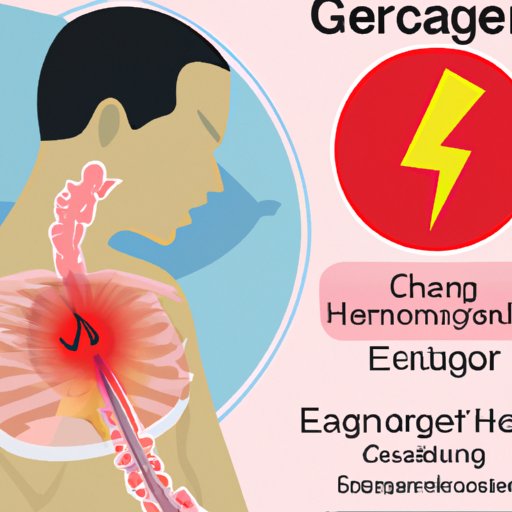
Recognizing the Top Signs of Esophageal Cancer
Esophageal cancer is a type of cancer that affects the esophagus, the tube that connects your mouth to your stomach. It is a relatively rare type of cancer but can still have serious consequences if not detected and treated early. Unfortunately, symptoms of esophageal cancer can be vague and may mimic other conditions, making it difficult to diagnose. In this article, we will outline the top signs of esophageal cancer and why early detection is crucial for successful treatment.
Top 5 Signs that Indicate You May Have Esophageal Cancer
The following are the five most common symptoms experienced by people with esophageal cancer. If you are experiencing any of these symptoms, you should discuss them with your doctor, especially if they have persisted for two weeks or more.
Difficulty Swallowing or Pain While Swallowing
One of the most common symptoms of esophageal cancer is difficulty swallowing, also known as dysphagia. This can be caused by the narrowing of the esophagus due to cancerous growths, making it difficult for food and liquids to pass through. You may also experience discomfort or pain while swallowing, which can worsen over time.
Weight Loss and Loss of Appetite
A sudden and unexplained loss of weight may be a sign of esophageal cancer, especially in combination with a loss of appetite. As the cancer progresses, the tumor may interfere with your ability to eat or digest food properly, leading to weight loss.
Heartburn and Acid Reflux
Heartburn and acid reflux are common digestive issues that can happen to anyone, but persistent or severe symptoms may indicate esophageal cancer. Acid reflux causes stomach acid to back up into the esophagus, causing a burning sensation. When left untreated, acid reflux may damage the lining of the esophagus, increasing the risk of cancer.
Chronic Cough and Hoarseness
A persistent cough that does not go away, especially if it is accompanied by hoarseness or a change in your voice, may indicate esophageal cancer. This happens when the cancerous growths irritate or obstruct the nerves that control your voice box and lungs.
Chest Pain or Discomfort
Chest pain or discomfort can be a symptom of many medical conditions, including esophageal cancer. In some cases, the tumor can press against the esophagus or surrounding tissues, causing pain or discomfort in the chest area.
Warning Signs of Esophageal Cancer that You Should Not Ignore
The following symptoms may indicate advanced-stage esophageal cancer. If you experience any of these symptoms, you should seek medical attention right away. Early detection and treatment can significantly improve your chances of a successful recovery.
Blood in Vomit or Stool
If you notice any blood in your vomit or stool, it may indicate advanced-stage esophageal cancer. The tumor can bleed and cause the blood to appear in your vomit or stool.
Persistent Pain or Discomfort in the Chest or Back
Advanced esophageal cancer can cause pain or discomfort that persists even when you are not eating or swallowing. The tumor may press against the surrounding tissues, nerves, or organs, causing pain or discomfort in the chest or back area.
Recognizing the Symptoms of Esophageal Cancer for Early Detection and Treatment
The earlier esophageal cancer is detected, the higher the chances are for successful treatment and recovery. If you have a family history of esophageal cancer or have been exposed to certain risk factors such as smoking or GERD, you should be more aware of the following symptoms and seek medical attention if you experience them.
Dysphagia or Difficulty Swallowing
If you experience difficulty swallowing, you should seek medical attention, especially if it persists for more than two weeks. Your doctor may recommend further testing to rule out esophageal cancer.
Unexplained Weight Loss
If you are losing weight without trying or have a loss of appetite, it may be a sign of an underlying condition such as esophageal cancer. Consult with your doctor if you notice sudden or unexplained weight loss.
Heartburn or Acid Reflux
Heartburn or acid reflux can be a sign of a more severe condition such as GERD or esophageal cancer. If you experience symptoms such as a burning sensation in your chest, see your doctor for diagnosis and treatment.
A Comprehensive Guide to Identifying the Symptoms of Esophageal Cancer
Esophageal cancer can be a severe and life-threatening condition. The signs and symptoms can sometimes be difficult to spot, making it important to be proactive about your health. If you have any concerns or questions about the symptoms of esophageal cancer, speak to your doctor. Remember to share this information with your loved ones to spread awareness and promote early detection and treatment.
Key Takeaways
- Esophageal cancer is a type of cancer that affects the esophagus.
- The top 5 signs of esophageal cancer include difficulty swallowing, weight loss, heartburn, chronic cough, and chest pain.
- Warning signs of advanced-stage esophageal cancer include blood in vomit or stool and persistent pain or discomfort in the chest or back.
- Early detection is critical for successful treatment and recovery.
- Speak to your doctor if you experience any of these symptoms for more than two weeks.
Resources
For more information about esophageal cancer symptoms, risk factors, and treatment options, visit the National Cancer Institute website and the American Cancer Society website.




